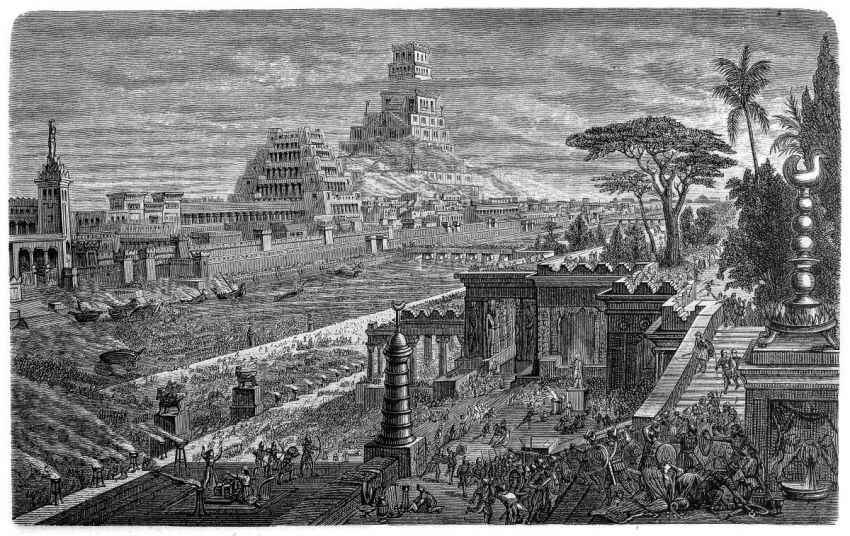Revelation 14: A second angel announces ‘Babylon is Fallen’

On V-E Day (Victory in Europe), May 8, 1945, President Harry S. Truman made the official announcement by radio from the White House that Germany had surrendered. World War II had taken a tremendous toll on America. Many other countries suffered greatly. Justice had been served in defeating the Nazis.
Upon hearing this announcement, Americans responded with widespread jubilation and relief. Celebrations erupted across the country, with people taking to the streets, waving American flags, and cheering. Many cities hosted impromptu parades with ticker tape, dancing, singing, and frivolity. Times Square in New York City was filled with people celebrating the news.
On a global scale, Germany’s surrender had profound implications, liberating numerous nations under Germany’s occupation and bringing with their freedom immense happiness. In Europe, they were also waving flags, cheering, and embracing one another. It marked the end of six years of tyranny, oppression, and even genocide.
V-E Day, however, didn’t denote the end of all the conflict during World War II. Japan was still at war with the United States and its allies. The surrender of Japan would later be announced on August 15, 1945, which came to be known as V-J Day (Victory over Japan).
In Revelation 14 verse 8, another angel appears on the scene and announces something of worldwide significance. This is what the Bible says:
“Then another angel followed him through the sky, shouting, ‘Babylon is fallen — that great city is fallen — because she made all the nations of the world drink the wine of her passionate immorality.’”
The interpretation of Babylon in this passage, as well as chapter 17 of Revelation, is a complex and debated topic among biblical scholars. Nevertheless, whether the passage is interpreted literally or symbolically, historically or futuristically, one can only imagine the elation and euphoria of God’s people when they heard that what marginalized, persecuted, and nearly exterminated them would soon collapse. The message conveyed was that Babylon was as good as defeated and the suffering of God’s elect would end shortly.
Because Revelation is a highly symbolic and apocalyptic book, interpretations of “Babylon” are understood in several different ways. There are even various nuances and divergences within each category.
Here are a few of those views.
First, some interpret “Babylon” as a literal city and contend that ancient Babylon located in Iraq, speaks of a physical city that will actually be rebuilt and become the capital of the Antichrist’s global economic, political, and religious system.
During the Gulf War in the 1990s, many well-known Christian sages thought that war might be related to the biblical prophecies concerning Babylon. Moreover, Saddam Hussein had already started restoration work on Babylon.
Hal Lindsey, a prominent Christian author on end-time events, argued in his book, Planet Earth: The Final Chapter, that the Gulf War might pave the way for the fulfillment of the prophecies concerning Babylon mentioned in Revelation.
Grant Jeffrey, a Canadian Christian author, whose 27 books sold more than seven million copies, and whose bestselling titles were about prophecy, felt similarly. Like Lindsey, in his book, The Next World War: What Prophecy Reveals About Extreme Islamand the West, Jeffrey speculated that the United States’ involvement in the Gulf War could be a precursor to the future rebuilding and destruction of the literal city of Babylon.
Nonetheless, Larry R. Heyler and Richard Wagner, in their book, The Book of Revelation for Dummies, reference this view and conclude: “Needless to say, the initial enthusiasm has cooled in light of more recent years. Still, some of the faithful continue to teach that ancient Babylon will literally be rebuilt.”
Second, those who interpret “Babylon” symbolically might see it to refer to Rome, more specifically, the same Rome during the time Revelation was penned by the apostle John. This view suggests that the fall of Babylon is symbolic of God’s judgment on the Roman Empire, which ruthlessly persecuted Christians.
Renowned Scottish New Testament commentator, William Barclay took the symbolic view and wrote of Revelation 14:8:
“Here is prophesied the doom of Rome. Throughout the Revelation Rome is described as Babylon … In the ancient days, Babylon to the prophets had been the very incarnation of power and lust and luxury and sin; and to the early Jewish Christians Babylon seemed to have been reborn in the lust and luxury and immorality of Rome.”
But some who also interpret “Babylon” symbolically interpret it in a broader context, suggesting essentially it represents the spirit of rebellion against God and godless worldly systems of power and wealth throughout history. In this view, Babylon can signify any society or system that opposes the values and principles God outlined in his Word.
This view has considerable merit. Although identification of America as “Babylon” in the book of Revelation would not be something theologians and scholars would universally agree on and shouldn’t. There are, nonetheless, certain characteristics of the ancient city that are at least nonliterally similar to contemporary America.
This should cause us to pause and consider carefully how incredibly close the United States is to falling by God’s hand of judgment.
Babylon was sitting on top of the world. It was highly materialistic, where material possessions and wealth took precedence over spiritual values. This is true for America today. Babylon exerted considerable cultural influences on surrounding nations, and similarly, America’s media, its entertainment industry, and consumerism have had an undue negative influence on a global scale. Babylon was a society characterized by widespread moral decay, sexual immorality, and idolatry. Such is prevalent and pervasive in America now, and it’s widened from here to around the world. Babylon was a tremendous global economic power. Today America welcomes foreign direct investment like no other nation, attracting capital from around the world, and solidifying its economic superiority. Yet, because of the wholesale abandonment of its Judeo-Christian heritage, the nation’s many sins and rebellion against God, raise the question of how long it might be before the announcement is made that America’s judgment has come — “America has fallen.”
Third, a futuristic interpretation of “Babylon” gives it a future eschatological significance, representing a final and ultimate manifestation of opposition to God and Christ. This could be understood as the zenith of evil influences and forces before Christ’s Second Coming, symbolizing the final judgment of God upon everyone who opposes Him and His will.
Heyler and Wagner say a futuristic perspective believes John is using ancient Rome as a means of understanding the central power of the Antichrist. John takes language from the Old Testament prophet Isaiah, who predicted the downfall of Babylon for destroying Jerusalem and the first Temple. John applies the prophecy to Rome, which he sees as a new Babylon, responsible for the destruction of Jerusalem and the Second Temple. Rome may be seen as the ultimate Babylon, the capital of the Antichrist’s empire. They conclude, however, that the exact location of this capital and the identity of the Antichrist will only be known in the end days.
Note that the apostle John symbolically references the use of “wine” in Revelation 14:8. He writes that Babylon “made all the nations of the world drink the wine of her passionate immorality.”
Is it of no consequence that “wine” in the text is given a negative association of utmost importance? Certainly not! One would be foolish to overlook it.
Verse 8 associates wine with the seduction to sin. In verse 10, wine is associated with God’s wrath (something to be expounded on later).
Barclay has written:
“In this phrase, two Old Testament conceptions have been infused into one…The idea is that Babylon had been a corrupting force, which had lured the nations into a kind of insane immorality. The background is a picture of a prostitute persuading a man into immorality by filling him full of wine so that he could no longer resist her wiles …The other picture is of the cup of the wrath of God. Job says of the wicked man: “Let him drink of the wrath of the Almighty (Job 21:20). The Psalmist speaks of the wicked having to drink the dregs of the red cup in the hand of God (Psalm 75:8). Isaiah speaks of Jerusalem having drunk the cup of God’s fury (Isaiah 51:17). God instructs Jeremiah to take the wine cup of his fury and to give it to the nations to drink (Jeremiah 25:15).
“We might paraphrase by saying that Babylon made the nations drink of the wine which seduces men to fornication and which brings as its consequence the wrath of God.”
Granted, wine is also associated with joy and celebration in the Bible. However, the Hebrew word for “wine” in the Bible doesn’t always refer to an intoxicating wine. The context in Scripture determines whether it was a fermented wine or unfermented. For those quick to deny that no unfermented wine could have existed in the days of the ancients, the historical evidence is quite powerful to the contrary.
Statements by Aristotle, Hippocrates, Homer, Athenaeus, Columella, Pliny, Plutarch, Virgil, and Theophrastus, show that fresh unfermented wine was common. The ancients knew how to preserve it from its intoxicating effects.
Modern-day acknowledgments of unfermented wine in ancient times include people like Dr. Lyman Abbott in the 1876 edition of A Dictionary of Religious Knowledge.
Abbott said:
“There is no doubt that there were three principal kinds of wine known to the ancients. First, there was fermented wine. It contained what is the only objectionable element in modern wines, a percentage of alcohol. It was the least common, and the percentage of alcohol was small … Second, were the new wines. These, like our cider, were wholly without alcohol and were not intoxicating. They were easily preserved in this condition for several months. Third were wines in which, by boiling or by drugs, the process of fermentation was prevented and alcohol excluded.”
Abbott was clearly stating that there is absolutely no doubt unfermented wine was common in ancient times.
Dr. Robert P. Teachout, a graduate of Dallas Theological Seminary in Dallas, Texas, wrote a scholarly work in 1979, titled, “The Use of ‘Wine’ in the Old Testament.”
Teachout argued:
“One kind of ‘wine’ (Greek oinos, Latin vinum) which was explicitly valued and drunk in the Graco-Roman world was unfermented grape juice. (Whereas this was, of course, also true of the early Egyptians and the Mesopotamian peoples, the evidence for it is not as readily available or extensive.) Not one but several different means were used to preserve the juice long after the harvest.”
There is no need to stumble over this, we use the word “drink” in the same way today. If someone says, “Let’s stop at the store and get a drink.” The expression could be taken two ways. One might mean to stop and get an alcoholic beverage, or one might mean to stop and purchase a soda. The context is what determines the meaning of the word. So, it is in the Bible’s use of the word, “wine.”
The incomparable Christian apologist, Norman Geisler, however, did not fully agree with the previously stated understanding of alcohol use. He took a different position, one that is likewise worthy of consideration.
Geisler believed and taught in "To Drink or Not to Drink: A Sober Look at the Question," that the Bible clearly condemns strong drink as a beverage.
Geisler contended that by biblical standards beer and wine, which were consumed moderately in Bible times were likely to have been fermented but significantly diluted with water and didn’t cause intoxication in normal usage. Therefore, he concluded modern alcoholic beverages, the typical wine, beer, and spirits which are heavy in alcohol content, cannot be compared to the “wine” which was unforbidden in Bible times. Instead, today’s forms of alcohol, beer, wine, and spirits, would fall under the category of “strong drink” and thus patently prohibited.
The point here is that whatever position one takes, social drinking as it’s known today is not supported by the Bible. While unfermented wine may be associated with refreshment and celebration, fermented wine represents sin and decay. Although diluted wine, with very low alcohol content, can be related to joy and healing, strong drink is associated with drunkenness, impaired judgment, temptation, and moral stumbling. This explains the seeming contradiction of Scripture on the subject of alcohol.
It’s not simply that alcoholic wine or beverages is something one must be careful not to drink in excess, the bottom line is that the beverage itself is tricky and indicative of danger and destruction for those who drink.
Dr. James Merritt, once the president of the Southern Baptist Convention, made an astute observation from Proverbs 20:1 in his book Friends, Foes and Fools. The passage from Proverbs reads: “Wine is a mocker, Strong drink is a brawler, And, whoever is led astray by it is not wise.”
“Note the warning that the one who imbibes can be ‘led astray,’” writes Merritt. “Solomon was not only saying that drunkenness leads one astray – that is a truism. He was making the observation that wine and strong drink have an inherent tendency to ‘lead one astray.’” [Bold letters and underling by the author, not James Merritt.]
In other words, it’s a given that drunkenness is wrong and should be guarded against. Nevertheless, equally important to recognize is that alcohol itself is inherently problematic. Because of its nature to create problems, both big and small, those who would be wise in life will avoid the use of intoxicating beverages.
It is difficult to understand why some seem so willing to go out of their way to defend the use of alcohol when it’s mostly related to incalculable depravity, debauchery, and disgusting behavior. It’s especially difficult to understand why Christians would be rather glib about its use.
Geisler further writes:
“Although drunkenness is a serious sin, it is not the only reason to abstain from alcohol. Indeed, there are some twenty reasons listed for abstaining from intoxicants in the Bible:
1. It slows the thinking process (Proverbs 31:4–5).
2. It makes one dizzy (Job 12:25).
3. It is associated with self-centeredness (Hab. 2:5).
4. It causes sickness (Jer. 25:27).
5. It causes forgetfulness (Prov. 31:6–7).
6. It produces delirious dreams (Prov. 23:33).
7. It results in sleepiness (Gen. 9:20–25).
8. It produces complacence and laziness (Zeph. 1:12).
9. It numbs one’s feelings (Prov 23:31–35).
10. It leads to poverty (Prov 21:17).
11. It leads to brokenness (Jer. 23:9).
12. It results in sadness and depression (Isa. 16:9–10).
13. It causes sorrow (Prov. 23:29–30).
14. It produces blackouts (Gen. 19:33–35).
15. It leads to immorality (Joel 3:3).
16. It encourages sexual perversion (Hab. 2:15).
17. It results in guilt (Isa. 24:20).
18. It causes injuries (Prov. 23:35).
19. It can result in insanity (Jer. 51:7).
20. It makes one vulnerable to his enemies (1 Sam. 13:28)”
Nonetheless, it is important to make certain that no one gets the wrong impression — that Revelation 14:8 is actually about whether to drink alcohol or not to drink.
The real focus of the text is on the divinely inspired emblems of Babylon and wine. It’s about a city, or a religious, philosophical, political, military system headed by the Antichrist, which figuratively speaking, like a seductress makes the entire world drunk on the wine she pushes, impairing the nations’ judgment to pursue passionate immorality with the one who seeks to overthrow God.
The angel’s announcement concerning Babylon’s fall is exceptionally good news for the saved. It assures them the assault on God and his people may go on for a while but will never ultimately succeed. The angel announces and says emphatically, not once but twice, “Babylon is fallen — that great city is fallen…” (Revelation 14:8).
Glory to God. What a joy to know tis so!
But isn’t it also interesting and revealing to see the way alcoholic wine (alcoholic beverages), moral decadence, idolatry, and passionate immorality, all hang together?
Rev. Mark H. Creech is Executive Director of the Christian Action League of North Carolina, Inc. He was a pastor for twenty years before taking this position, having served five different Southern Baptist churches in North Carolina and one Independent Baptist in upstate New York.



























